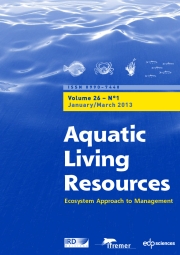Article contents
The effect of dietary n-3 highly unsaturated fatty acids on growth, survival and biochemical composition of the coral reef damselfish Acanthochromis polyacanthus
Published online by Cambridge University Press: 15 January 1999
Abstract
Larvae of the coral reef damselfish Acanthochromis polyacanthus (Bleeker) were fed either unenriched Artemia nauplii or nauplii which had been enriched by pre-feeding with microcapsules containing either squid oil (SQO) or cod liver oil (CLO). Enriched nauplii contained elevated levels of the n-3 highly unsaturated fatty acids (HUFA) eicosapentaenoic acid (EPA; 20:5n-3) and docosahexaenoic acid (DHA; 22:6n-3) which made up 5.22 ± 0.34 and 2.62 ± 0.28 %, respectively, of total fatty acids in nauplii enriched with CLO, and 10.48 ± 0.36 and 3.43 ± 0.33 %, respectively, in nauplii enriched with SQO. In contrast, unenriched nauplii contained EPA (5.03 ± 1.04 %) but did not contain DHA. Survival differed significantly between treatments over the 18-d study; larvae receiving CLO enriched nauplii showed 100 % survival and those receiving SQO enriched nauplii showed 93.3 ± 6.6 % survival. In contrast, only 46 ± 6.7 % of larvae receiving unenriched nauplii survived to the end of the 18-d study. Wet weight, dry weight and proximate biochemical composition did not differ significantly between treatments at the end of the study. Mean standard length of larvae fed CLO enriched nauplii was significantly smaller than that of larvae fed SQO enriched nauplii; however, neither differed significantly from larvae fed unenriched nauplii. The fatty acid composition of A. polyacanthus larvae was significantly influenced by the fatty acid composition of the diet. The results indicate that A. polyacanthus larvae are unable to synthesise DHA from available dietary precursors and, as such, dietary DHA is required to maximise survival. Development of appropriate culture techniques for the larvae of coral reef fishes will allow controlled laboratory studies with these species and may eventually reduce pressure on wild populations exploited for the aquarium trade.
- Type
- Research Article
- Information
- Copyright
- © Elsevier, Inra, Ifremer, Cemagref, Ird, Cnrs, 1999
- 13
- Cited by




